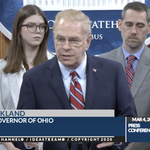
A bipartisan coalition of Ohio lawmakers has announced plans to introduce legislation to end capital punishment in the Buckeye State. At a press conference at the state capitol in Columbus on March 4, 2020, State Senator Nickie J. Antonio (D – Lakewood, pictured, left) said that she and Senator Peggy Lehner (R – Kettering, pictured, right) would be jointly sponsoring a bill to abolish the death penalty and replace it with a sentence of life without possibility of parole.
The announcement comes as executions in the state are on hold over lethal-injection concerns, and the current governor and house speaker, both Republicans, have expressed reservations about continuing the use of capital punishment.
“This is not a Republican or a Democratic issue,” Antonio said, flanked by Republican co-sponsor Kristina Roegner (R – Hudson), Democratic former Gov. Ted Strickland, representatives of Ohioans to Stop Executions and Ohio Conservatives Concerned About the Death Penalty, and faith leaders, including the Ohio Catholic Conference. “No matter what a person’s reason is for supporting this legislation, we all agree that this is critical for our own collective humanity. It is our responsibility to work together across party lines and legislative chambers and move forward to end the death penalty in Ohio.”
Antonio called the death penalty an “expensive, impractical, unjust, inhumane and frankly, often erroneous” punishment that does not deter violent crime and is fraught “with disparities across economic and racial lines.” Abolition, she said, would be a “compassionate, pragmatic and economically prudent step” for Ohio.

Former Governor Strickland offered support for the bill, expressing regret for failing to take action to end capital punishment when he was in office. Noting that a top prison official resigned during his tenure as governor because of the emotional toll of performing executions, Strickland said the 17 executions he presided over continue to bother him to this day. “You can’t correct a mistake,” he said. “I am convinced that if we continue to impose this penalty, we will at some point, at some place, at some time take the life of an innocent person. Our criminal justice system is not perfect. That means we should never impose this penalty on one of our fellow human beings.”
In her remarks, Senator Roegner recalled that “[w]hen I came to the General Assembly, I was for the death penalty. … But here I am.” Citing her religious beliefs, she said “it was my heart that changed. … I cannot be pro-life and support the death penalty any longer.”
Ohio will be the fifteenth death-penalty state to consider an abolition bill this legislative session. The bill has not been introduced yet, but Sen. Antonio said it will be introduced in the coming weeks. Ohio has the seventh-largest death row in the nation, with 140 prisoners. Its last execution took place in 2018.
Nick Swartsell, Bipartisan Legislation Seeking to End Ohio’s Death Penalty Coming to State Senate, Cleveland Scene, March 4, 2020; Ben Garbarek, Bipartisan group of Ohio senators want to end the death penalty, WSYX/WTTE, March 4, 2020; Jason Aubry, Senators propose legislation abolishing death penalty in Ohio, WJW, March 4, 2020; Jo Ingles, Former Ohio Governor Says He Regrets Not Working For Abolishment Of The Death Penalty, Statehouse News Bureau, March 4, 2020; Legislation Seeking to End Ohio’s Death Penalty Coming to State Senate, Cincinnati City Beat, March 4, 2020; News Release, Antonio Announces Bipartisan Bill to End Death Penalty, Office of State Senator Nickie J. Antonio, March 4, 2020.
Watch video of the news conference from the Ohio Channel.



